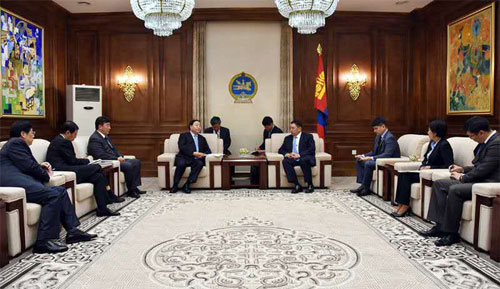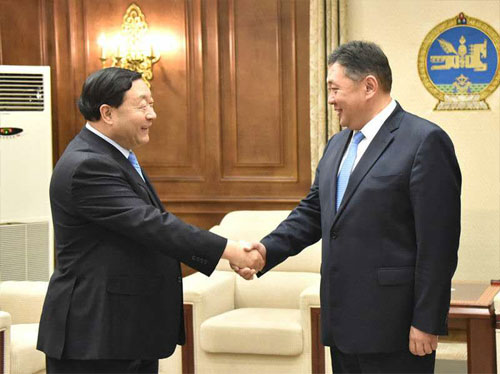On August 25, Liu Zhenya, Chairman of Global Energy Interconnection Development and Cooperation Organization (GEIDCO) and Chairman of China Electricity Council (CEC) held talks with Mongolian State Great Hural Chairman (Speaker) Enkhbold and Prime Minister Alden Bart in Ulaanbaatar regarding strengthening energy cooperation between China and Mongolia, promoting key projects development, Northeast Asia's power grid interconnection as well as Global Energy Interconnection (GEI). Chinese Ambassador to Mongolia, Mongolia Energy Minister, Minister of Environmental Protection, Minister of Transportation and other Mongolian government officials attended the meeting.

Liu Zhenya stated that Chinese President Xi Jinping proposed discussions on establishing a global energy interconnection to facilitate efforts to meet the global power demand with clean and green alternatives at UN Sustainable Development Summit on September 26, 2015, which has received wide attention from and been actively responded by the international community. GEI is a globally interconnected strong and smart grid backboned by UHV grids; its essence is "Smart Grid + UHV + Clean Energy". GEI and two replacements (clean energy replacement in energy production and electricity replacement in energy consumption) are the inevitable way out to cope with global resource constraints, environmental pollution and climate change and realize the sustainable development of world energy.
Liu Zhenya said electricity would be an important trading product in the future. Mongolia is rich in energy resources with proven reserves of about 152 billion tons of coal. The installed capacity of wind and solar resources, if converted into thermal power, is 500GW and 700GW respectively. It plays to Mongolia's resource advantage as they can be turned into economic advantages and create a long-term economic growth point by constructing large-scale energy bases in Mongolia and delivering electricity to load centers in China, South Korea, Japan and even South Asia and Europe via UHV grids. Northeast Asia is one of the world's most active areas of economic development with huge energy demand, and the huge energy demand and highly complementary resources will be a stable energy market for Mongolia. Among them, China will remain the largest energy market in Northeast Asia with the fastest growth; hence Sino-Mongolia energy cooperation has broad prospects.
Liu Zhenya noted that Xibe Obo project was an important part of the Northeast Asia energy interconnection and had a special significance for the economic and social development of Mongolia. He hoped that Mongolia attached great attention and supported Xibe Obo project, provided necessary policy support, and carried out active consultations with China, South Korea and Japan to reach a consensus at the government level. The working group between China and Mongolia will strengthen cooperation and accelerate feasibility study.
Chairman Enkhbold noted that Mongolia was rich in resources and had great potential for development. Economic and social reform of Mongolia was stable, continuous, and in favor of foreign investment. There are a lot of Sino-Mongolian economic cooperation projects and achievements. Mongolia has proposed to establish Mongolia -China - Russia Infrastructure Research Center to promote cooperation in highway, railway, aviation, and energy. Xibe Obo project has been supported in the past and will be in the future, said Enkhbold, who also wished the project a great success.
Prime Minister Earl den Bart expressed full support from the Mongolian side of the GEI initiative proposed by Chinese President Xi Jinping last year at the UN Development Summit, and believed that the clean energy would dominate the energy mix in the future. Mongolia has abundant energy resources and clean energy, which is an advantage. He said the Government of Mongolia was also open-minded for sending electric power out. Breakthroughs in UHV transmission technology made it possible to build GEI, which may also enhance economic and trade exchanges between China and Mongolia and turn Mongolia's resource advantages into economic advantages.

Prior to the talks, Chairman Liu Zhenya paid a special visit to Chinese ambassador to Mongolia and made a report, which has been acknowledged and supported by Ambassador Xing Haiming.
Xibe Obo project plans to build an energy base in Mongolia and sends power to China via UHV. On November 10, 2015, witnessed by state heads of Mongolia and China, SGCC and Mongolia Ministry of Energy signed an agreement to conduct feasibility study for Xibe Obo project. The feasibility study was officially launched in April this year. Estimated investment will be about USD 12 billion. The five-year construction period could create 25,000 jobs in Mongolia, ushering in an average increase in GDP growth rate by 4 percentage points per year.